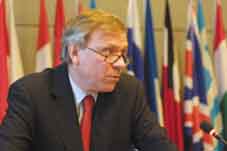US: NATO trainings no threat to Russia
By Temuri Kiguradze
Thursday, April 23

“The NATO exercises are a normal part of NATO’s relationship with Georgia. And the purpose of these exercises is to help Georgia meet NATO standards. I know there have been reports about Russia being concerned about these exercises. Look, these exercises are no threat to Russia, to anybody else, and they’ve been in the planning stages for a long time,” said Robert Wood, Acting Spokesperson for the Department.
The exercises, called Cooperative Longbow 09/Cooperative Lancer 09, will involve up to 1,300 servicemen from different countries. Russia has expressed its strong protest against these trainings, calling them “provocative” and “not serving stability in the region.” The pro-Kremlin de facto authorities of the Georgian breakaway regions of Abkhazia and South Ossetia have warned that they “may conduct their own military trainings” in response to the NATO manoeuvres.
These statements are being made while Russia increases its military potential near the Georgian administrative borders to “counter the revanchist attitudes” of Georgia. The decision to conduct the exercises "is aimed at muscle-flexing" and will hinder the resumption of full-scale contacts between Moscow and NATO, Russian President Dmitry Medvedev was quoted by the BBC as saying on April 17.
“Georgia has the constitutional right to hold any kind of training it wants on our sovereign territory and Russia has no right to have an opinion about it,” said Georgian Foreign Minister Grigol Vashadze on April 21. “Instead of making comments about NATO exercises in Georgia, Russia would be better off starting to de-occupy the Georgian territories,” he added. This statement was made in response to an announcement by Russian envoy to NATO Dmitry Rogozin, who had announced that he had sent a letter to NATO General Secretary Jaap de Hoop Scheffer advising him to review the possibility of the trainings taking place.
The exercises were originally supposed to involve representative of 19 countries; however on April 20 it became known that Estonia, Latvia and Kazakhstan would not take part. Russian news agency Regnum quotes Latvian Defence Minister Airis Rikveilis as saying that at present “the situation doesn’t allow us to send additional servicemen” to participate in the trainings. Rikveilis underlined that the financial situation was not the basis for Latvia’s decision. Estonia and Kazakhstan have not given any explanation for their withdrawal.
